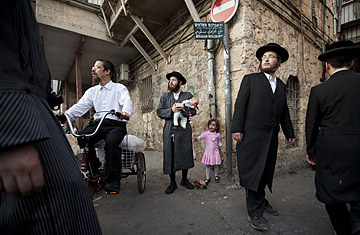
Ultra Orthodox Jews attend the funeral of Rabbi Yosef Shalom Elyashiv in Jerusalem, Wednesday, July 18, 2012. Elyashiv, revered by Jews worldwide as the top rabbinic authority of this generation for his scholarship and rulings on complex elements of Jewish law, died Wednesday, hospital officials said. He was 102.
(4 of 6)
Pinchasi qualifies as a prototype. "I'm not an atheist," he says. His family lights a candle and blesses the wine on Friday nights. Yet religion is an almost vestigial element of his primary identity, which is Israeli. Pinchasi personifies the New Jew, the muscular alternative early Zionist fashioned against the stereotype of the scrawny scholar of Eastern Europe's ghettos--precisely the type embraced by the ultra-Orthodox. First as a paratrooper, then as a sky marshal and finally as a bodyguard for Israel's President, Pinchasi devoted the first half of his life to protecting the state. When, in his 30s, he left the field to younger men, he decided to make a living with a driving school, only to find himself tooling around a city that looked less and less like him.
Jerusalem's holiness was reasserting itself. "The whole idea of the spiritual Jerusalem is becoming much stronger," says Rabbi Moshe Grylak, editor in chief of the ultra-Orthodox weekly Mishpacha. For decades, religious Jews, keen to remain near the Western Wall of the Second Temple, lived in the Old City or in a couple of neighborhoods outside. Today Jerusalem's entire north side teems with men in black and women in wigs pushing baby carriages.
Their numbers brought political power, which brought money. In Israel's parliamentary system, governments are formed by coalitions; since 1977, all but one have included ultra-Orthodox parties. They make great partners: religious parties deliver votes and in return ask only to continue to be left alone with their state subsidies for small children, housing and the religious schools that men attend most of their adult lives. "They're working in a world economy but not in this world," says Bar Ilan University professor Menachem Friedman, an expert on the ultra-Orthodox. "They're accumulating mitzvahs to get a good seat in the next world."
The arrangement began in 1948, when Israel's founders created just 400 slots to replenish the stock of Torah scholars wiped out in the Holocaust. Thirty years later, Menachem Begin saw votes in increasing the number, and today Torah study has become an entitlement. Not even half of ultra-Orthodox men work for wages. Fewer still serve in the military. The situation engenders resentment among taxpayers and veterans that is lately exploding into the political realm. One of the events that shattered Netanyahu's coalition was the "suckers protest," 20,000 people taking their objections to the ultra-Orthodox into the streets--the venue Pinchasi has been sneaking down to for two years, always under cover of darkness.
Pinchasi ghosts around the block in his wife's car, a white Subaru model called, nicely, a B4. The first lap is with headlights off. "I'm trying not to be paranoid," Pinchasi says, but it's a night operation in the new battle for Jerusalem, and he's been tailed before. More than once, he says, an unmarked car disturbed the stillness of a Sabbath night a moment after his own car passed, falling in a few lengths back.
Another Friday after midnight, a squad car pulled up just as he got behind the wheel. "Hi, Noam," the officer said. "Where are you going? I hope you're not out to make trouble." Pinchasi smiled. On the backseat lay a pot of glue and a roll of posters celebrating the unclothed female form. "I'm going here and there," Pinchasi said, only the truth.
